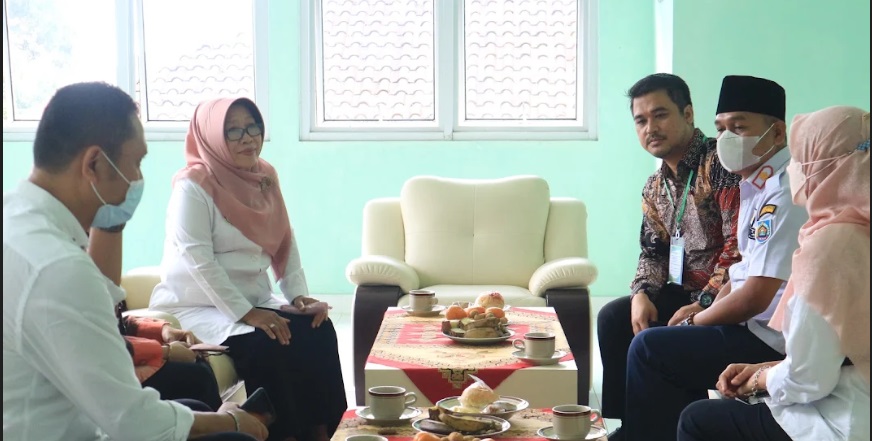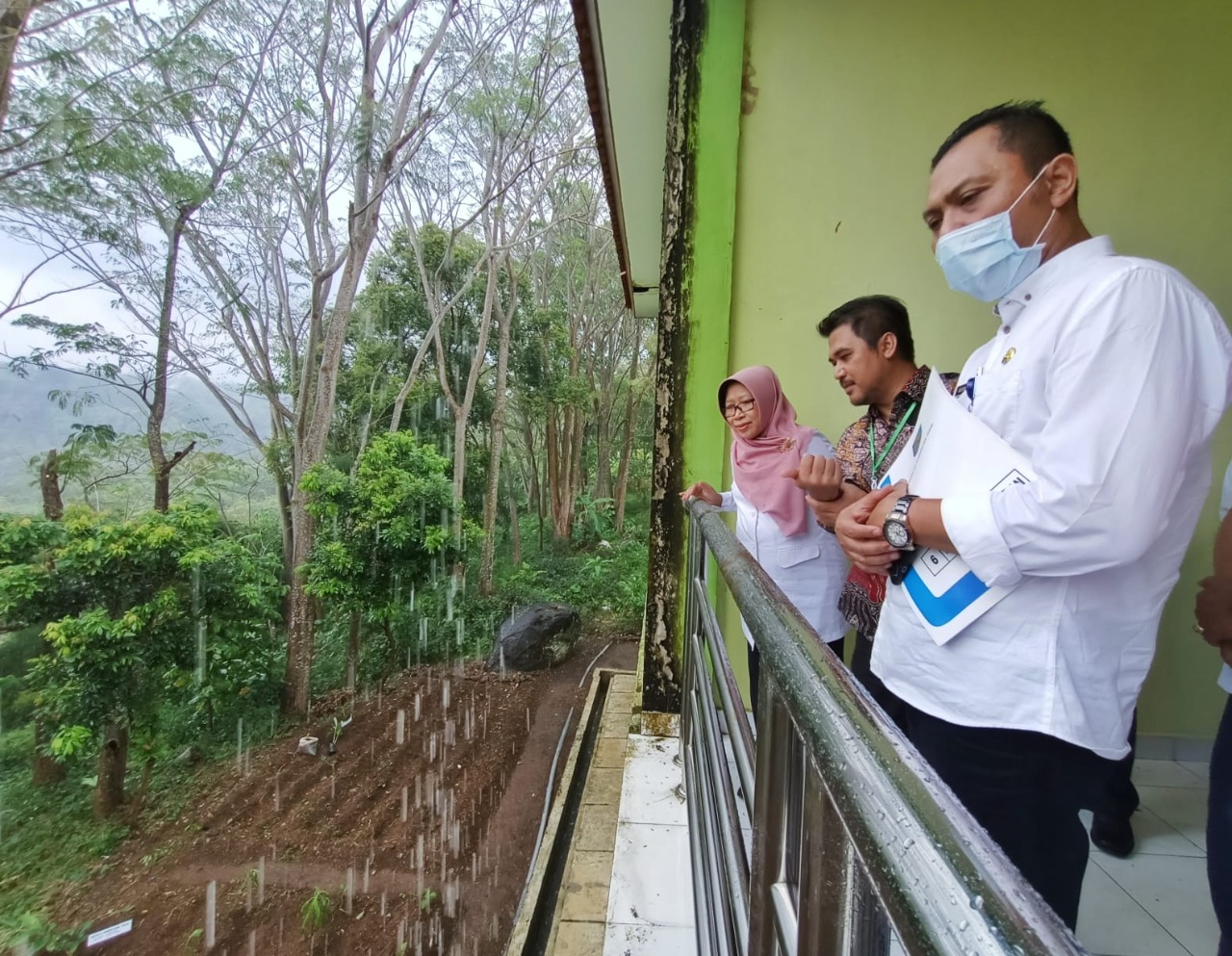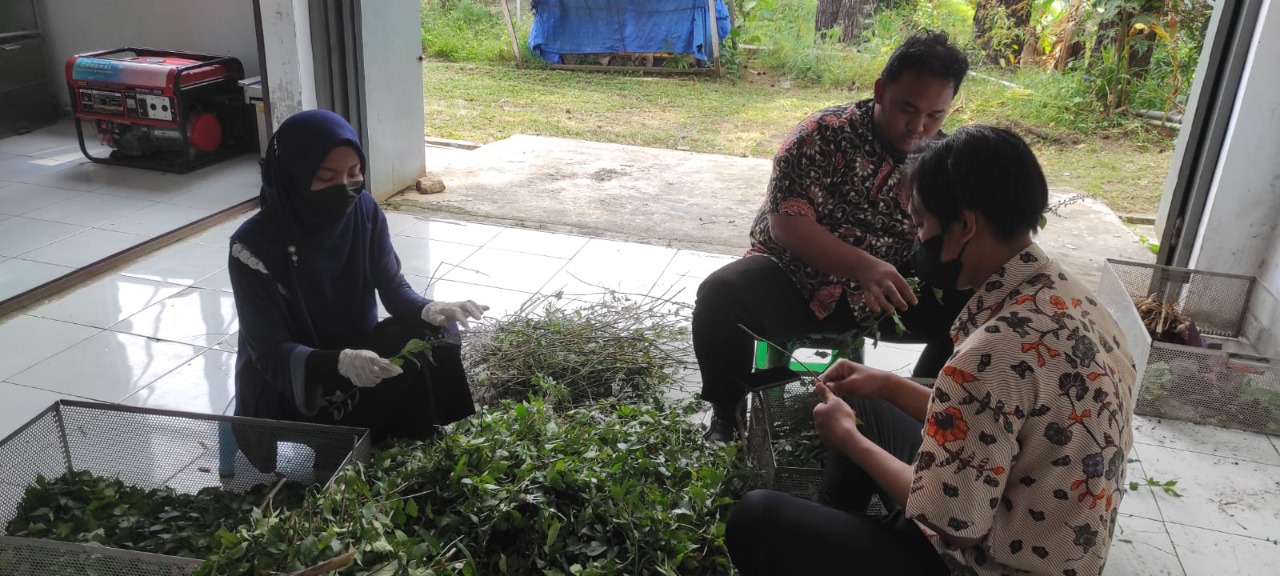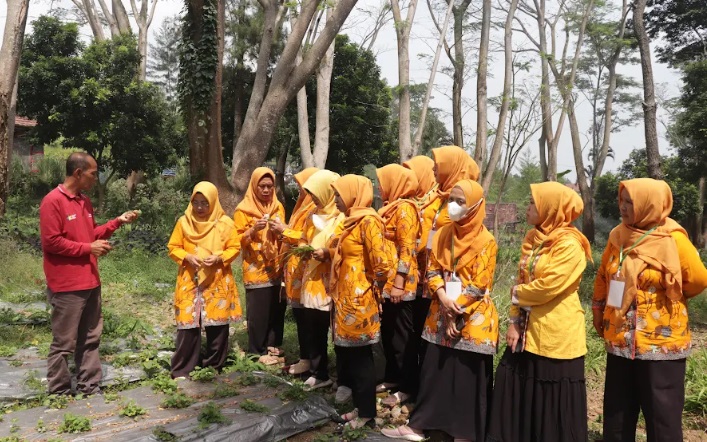Develops Herbal Plants, Tegal Regent Appreciates UNSOED
[unsoed.ac.id, Fri, 05/08/22] Universitas Jenderal Soedirman (Unsoed) empowerment team received appreciation from Tegal Regent Dra. Hj Umi Azizah. The Empowerment Team carried out the National Competitive Basic Research (PDKN) with the theme "green economy" in the form of empowerment activities for the residents of Kalibakung Village, Balapulang District in the form of plant cultivation and herbal products.
It is hoped that the partnership between the Regional Technical Implementation Unit - Herbal Health Tourism (UPTD WKJ) Kalibakung, with the surrounding community and Unsoed will continue to be able to synergize and be independent in developing plants and herbal products. "On behalf of the Tegal Regency Government, I thank you for the empowerment activities carried out by the Unsoed PDKN Team in Kalibakung Village. I praise and salute that this activity is very useful," said Regent Dra. Umi Azizah when closing the Empowerment of Herbal Plants Cultivation activity in UPTD WKJ Kalibakung, Wednesday (3/8).
Present at the event, the Chairman of the Institute for Research and Community Service (LPPM) Unsoed Prof. Dr. Rifda Naufalin SP., M.Si, Head of the Unsoed Empowerment Team Dr. Adhi Iman Sulaiman, S.IP., M.Si, Head of the Tegal District Health Office, dr. Ruszaeni, SH, M.Mr, Head of UPTD WKJ Kalibakung Umi Diah Arti, S.KM, subdistrict head and Muspika Balapulang, Head of Kalibakung Mujiyono Village, ST MH and participants of the herbal plant empowerment training.
The training activity for empowering plants and herbal products was held from Friday (15/7) to Wednesday (3/8), in the form of theory and practice in the field, attended by 27 people. Namely 15 people from elements of the PKK, Posyandu and Farmer Women's Group (KWT) from the younger generation of Kalibakung Village, 5 people from the UPTD WKJ Clinic and 5 Unsoed students.
The Regent of Tegal, Umi Azizah, believes that in the future herbal medicine will develop and be of interest to the public. This is in line with global issues and the lifestyle of returning to nature. Back to nature is a current trend that people return to using various natural ingredients, including treatment with medicinal plants or herbs. However, many people in the community do not have sufficient information about medicinal plants. "This is a challenge for the Tegal Regency Government and WKJ Kalibakung, to continue to socialize the benefits of medicinal plants for the community," said Umi Azizah.
Regent Umi Azizah emphasized that the UPTD WKJ Kalibakung, as the only one in Central Java and a flagship project of the Tegal Regency Government, will maximize its role in the future. So far, it is acknowledged that the existence of the Kalibakung WKJ UPTD is not widely known by the public, and the surrounding community has not been empowered to supply various needs for medicinal plants, such as ginger, cat's whiskers, turmeric, aromatic ginger, lemongrass, galangal, cardamom and so on.
The need for medicinal plants of UPTD WKJ Kalibakung, 65 percent in the form of simplisa or medicinal plants which have been dried, are supplied from the Center for Research and Development of Medicinal Plants (B2P2TOOT) Tawangmangu-Karanganyar, and the remaining 35 percent from the plants that they grow their own.
For this reason, the Regent invites farmers in Kalibakung in particular, to be interested in cultivating herbal plants by utilizing home gardens or gardens to become agricultural land for horticulture and herbal plants. Cultivating these herbal plants or empon-empon, in addition to protecting biodiversity and preserving local wisdom, can also bring economic benefits from the sale of raw materials for herbal plants and those that are already in the form of simplicia.
"For this reason, I ask WKJ Kalibakung to be able to accommodate and buy crops from these fostered partners, so that our dependence on the supply of herbal ingredients purchased from a number of traditional markets in Solo such as Pasar Gede or farmers in Karanganyar can be reduced," he said.
Meanwhile, the Head of the Unsoed Empowerment Team, Dr. Adhi Iman Sulaiman, S.IP., M.Si reported that during the training the participants received both theoretical and practical material. For theory, participants were given knowledge about types of family medicinal plants, herbal drinks, herbal simplicia (dried herbal ingredients), and tips on news coverage of superior products and tourist areas as marketing promotions.
For practice materials, participants are taught to make herbal oil products, drinks and herbal powders, hand soap and floor soap from herbs, make herbal powder simplicial products, practice photography and make promotional videos to be published through mass media and social media such as Instagram and Facebook. .
The instructors in this activity, invite parties who are competent in their fields. They are from the Kalibakung WKJ Clinic, the Head of the National Herbal Medicine Traditional Health Professional Association (PP Kestrajamnas), the Unsoed Faculty of Pharmacy, the Unsoed Faculty of Agriculture, the Tawangmangu Center for Research and Development of Medicinal Plants and Traditional Medicines (B2P2TOOT) and journalists. (*)
Adhi explained that the target of the 2022 empowerment activity is to increase motivation and inspiration for participants on the benefits of plants and herbal products, at least to meet the needs of families and groups for health independence. In the future, it is expected to be a partner to supply herbal ingredients to WKJ Kalibakung which can provide added value for the community's economic business. "Then another target is to form an institutional group for cultivation and herbal products in the community that need to be sustainable," said Adhi Iman Sulaiman who is also a lecturer at Fisip Unsoed.
#unsoedmajuterus




